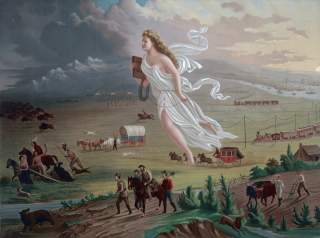Is America an Empire?
America’s zeal for anti-imperialist projects abroad has created a new imperialism of its own that is expansive and provocative of conflict.
A CONSCIOUSNESS of the collision between liberalism and force, felt so acutely by these early twentieth century liberals, is no longer characteristic of American sensibilities. It has been displaced by a heroic narrative emphasizing the indispensability of force, even massive force, to achieve the supreme goods, not simply compatible with but a requirement of liberty. These new lessons, which arose out of the Second World War, repudiated the disenchanted outlook of the previous generation and inculcated the idea that liberalism must lie down with force, though in the name of peace and freedom. As a new and better Europe arose from the ashes of World War II, that lesson was validated (then called into question by the experience of Vietnam). America’s mobilization of the warfare state also coincided with other remarkable advances in human liberty. It played, for instance, a significant role in the U.S. civil rights movement, as acute embarrassment arose in successive postwar administrations over the impossibility of reconciling America’s treatment of its segregated African Americans with its newfound world position. We can acknowledge these accomplishments without forgetting the older lesson, once held with passionate intensity, that liberalism would be in danger of losing its soul if its embrace of force became too close.
There is much in contemporary practice that bears out the historic warning. The logic by which, in order to be more safe, people are willing to be less free continues to exert its historic pull, as shown in the excesses of the war on terror and in the government’s avid efforts to create a surveillance state of universal reach and penetration. That the United States has quintupled its prison population over the last several decades, as it prosecuted its wars on drugs and crime, shows a propensity to solve social ills by coercive means that is of a piece with the militarization of its foreign policy. These developments are adverse to liberty (and also decidedly adverse to the freedom and equality of African Americans, cancelling out the earlier benefits inadvertently bestowed by the warfare state). In both domestic and foreign policy, a set of cultural codes for punishing wrongdoing, combined with the stout destructive and carceral capacities of the modern state, have proved very consequential. May we not see in these various developments a change in maxims from liberty to force?
Internationalism is invariably presented as a set of ideas that constitute a restraint on the exercise of the power impulse, but we should not exclude the possibility that it has often functioned over the last fifty years as a mask disguising it. Such would be the less charitable interpretation. More charitable is to see this as a tragic outcome, in which the very attempt to abridge the anarchy of the international system ended by enmeshing the United States within that anarchy, communicating its diseases through prolonged contact. Enemies learn one another’s weapons; the battle against evil left its expected residue. What was intended to make America more secure ended by instilling more insecurity, and with it collateral damage to liberty. For early-twentieth-century internationalists, the choice, as Daniel Deudney expresses it, was “either to transform the system or be transformed by it.” In the event, the attempt to transform the international system has transformed America, producing a concentration within its own institutions of the very ills it was intended to escape. Ridding the world of militarism meant ingurgitating 50 percent of it ourselves.
Even as the empire has threatened liberal ideals and republican values at home, it has presented an illiberal face to America’s adversaries, depriving them of national rights that we would surely claim if in their shoes. Its legitimating doctrines have repudiated central aspects of the pluralist or Westphalian tradition, among them nonintervention, the balance of power and the idea of concert, all of which suggest the need for limitation and restraint. Its formula of ideological antagonism and regime overthrow has been war provoking, not peace inducing. It badly needs a renovation in its basic architecture, one that recurs to first principles about the role of military power in a liberal republican regime. Madison’s precept regarding a standing military establishment is one such principle: “On the smallest scale it has its inconveniences. On an extensive scale its consequences may be fatal. On any scale it is an object of laudable circumspection and precaution.”
David C. Hendrickson is Professor of Political Science at Colorado College. This essay is adapted from Republic in Peril: American Empire and the Liberal Tradition, to be published December 1, 2017, by Oxford University Press.

